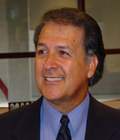Jaime Mercado
Sweetwater Union High
School District
Division of Adult and Continuing Education
Principal, National City Adult School, 2002-2004
Graduate, Mar Vista Adult School, 1963
Sweetwater Union High School District, 1973-2004
Other District Assignments
Principal
Assistant Principal
Resource Teacher
ESEA Program Specialist
Instructor
INTERVIEWER: Cuba Miller
JM: There were a couple of things. One, I had been [principal] in Mar Vista [High School for six years], and Mar Vista was where I had gone to school. It was fun.
CM: Actually before we talk about Palomar, I want to go back to Mar Vista, because you were principal at Mar Vista. There were still some teachers there.
JM: Yes. There were three of them that had been my teachers.
CM: How was that? Talk about that.
JM: When I was notified that I got the job at Mar Vista, I couldn't sleep for about a week. I'd already been in a school that I had to go and clean up. That wasn't a problem. The thing that kept me awake at night was, I am going to be the supervisor of three teachers that were my teachers. What if I have to tangle with one of them? How was I going to interact with them? Well, having come from Mexico, the culture [is very respectful of teachers]. I still call Mr. Mills [by his last name]. I don't call him Burke. Yet, I was his supervisor for six years. That's the kind of thing that I was dealing with. It was an interesting set of emotions that I went through when I got the job.
When I finally got there, during my first faculty meeting, I said to them as we finished the faculty meeting, "I want you to remember one thing. I want you to remember that what you say to kids and how you say it creates an impact in their life." I said, "No matter whether there are thousands of kids and if you don't even remember what you say, because we say things all the time, what you say to that kid and how you say it will make an impact, [and you never know who will come back to be your principal]."
I turned to Mr. Mills, who was sitting there, and I said, "Mr. Mills, I can tell you right now what you said to me word for word twenty-five years ago, and I appreciate everything that you did and said to me. And that created an impact on my life." I turned to another one, and I said, "Mr. Bush, I don't remember what you said to me word for word. I've got to be honest with you. But I do remember that it was a warm feeling and friendly feeling being around you and in your class." And then quickly I turned to another one and said, "And you, sir, I will see you after this meeting." (both laugh) I was kidding, of course, but he was not particularly a warm person.
So the next morning he was waiting for me by the time I got [to school] at six-thirty. He did say to me, "Did I treat you badly?" And I said, "No, you didn't. You didn't treat me badly, but you had no reason to treat me badly because I was an A student in your class." He said to me, "Did I give you A's?" I said, "You didn't give me A's. I earned them." I said, "If you'll remember, you had a policy that if one person — only one person could do this in the whole class — if he got 100 percent on the chapter test, you got to skip the other chapter test, and you got 100 percent on that chapter test provided you did [the chapter questions]." In essence you did all the other work. You just didn't take the test. I said, "Remember that? Well, I always got 100, and that's why I always got A's in your class." I said, "I do remember that you were not very complimentary to any kids. You never said a word to me. You never said good job or anything else. Other teachers wrote [things on my report card]. You never wrote anything. And you never wrote [comments] to any of the kids. I hope you've changed."

